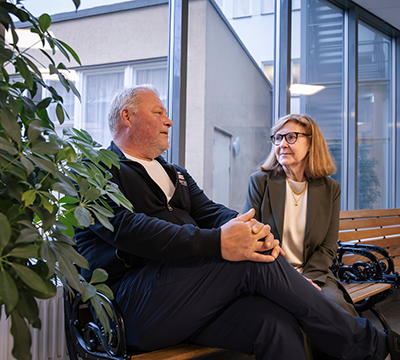Göran’s Journey – From Cancer Setbacks to Hope Through Research
When Göran Eriksson from Oxelösund, a small archipelago municipality in Sweden, discovered lumps on his neck nearly 25 years ago, he had no idea it would mark the start of a long and challenging journey. The diagnosis – lymphoma – was confirmed in 2001. Since then, Göran has undergone multiple treatments, including chemotherapy, radiation, and stem cell transplants. Despite setbacks, he never lost hope.

For many years, Göran has received advanced cancer care at Uppsala University Hospital. When the disease returned yet again, he was offered the chance to join a research study at Uppsala University – a collaboration between clinical care and research within Uppsala Comprehensive Cancer Centre (UCCC) and ATMP-centre Uppsala.
“I agreed to join the study immediately,” Göran says.
The study gave Göran access to a groundbreaking immunotherapy: CAR T-cell treatment. This therapy reprograms the body’s own T-cells to recognize and attack cancer cells. The treatment is the result of years of research led by Professor Gunilla Enblad, senior physician at Uppsala University Hospital.
“As a researcher and doctor, it’s incredibly rewarding to offer patients new treatments where cancer disappears year after year. I never thought I’d see this in my lifetime,” says Gunilla Enblad.
Behind the innovation is also Professor Magnus Essand, whose team developed a new type of CAR T-cell that not only targets tumors but also stimulates the immune system. In Göran’s study, the cells were engineered to release an immune-boosting factor – enhancing the effect and broadening the attack on the cancer.
“When I had the PET scan after treatment, no cancer cells were detected. That was a powerful moment,” Göran recalls.
CAR T-cell therapy is complex and personalized, mainly used for certain blood cancers. It offers hope but also risks. Göran admits he felt anxious – but trusted his care team.
“You know cancer can come back. But the researchers are hopeful, and I have a bag of extra CAR T-cells frozen in Uppsala if needed.”
Göran’s story shows how research and clinical expertise create new possibilities for patients with hard-to-treat cancer. For him, it means a new chance – and a future that feels possible again.
“I’m looking forward to turning 60, maybe retiring, spending more time with my grandchildren. And of course, playing golf.”

